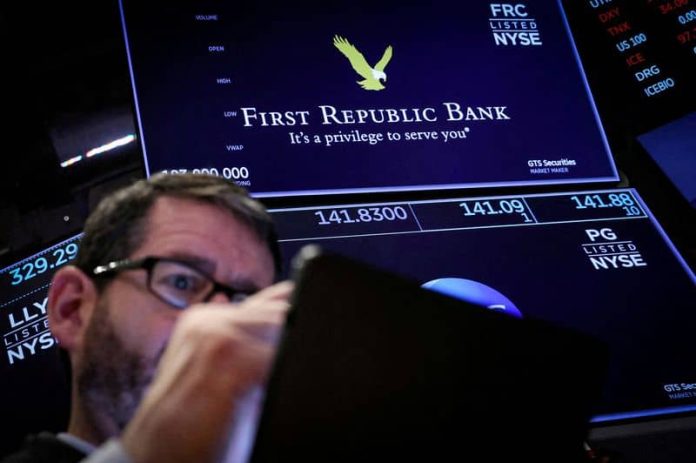(Reuters) – First Republic Bank (NYSE:FRC) faces an uphill challenge to regrow its business after losing more than half of its deposits, analysts said on Tuesday, as shares sank 20% in premarket trading after the bank reported its first-quarter earnings.
The beleaguered lender reported a more than $100 billion plunge in deposits in the quarter in the aftermath of the biggest crisis to hit the banking sector since 2008.
Wall Street analysts continue to see gray skies ahead for the bank, expecting challenges to extend through the year after two U.S. bank failures last month created a liquidity crunch at a slew of regional lenders.
Analysts at Wells Fargo (NYSE:WFC) said the reported deposit outflows were much worse than Wall Street estimates and at a “level that could prove very hard to come back from.”
The spotlight on the bank has also drawn in retail investors. First Republic was the most ordered stock on Fidelity’s platform on Monday, ending the day at a 12.2% gain, with a 64%/36% buy/sell split.
First Republic’s ticker is also among the most active on retail investor-focused Stocktwits.com on Tuesday morning.
However, about 36% of the bank’s free float of shares were short, according to FIS Astec Analytics.
Deposit flight has been at the center of investor concerns as clients move capital towards money market funds that bring in higher returns or larger ‘too-big-to-fail’ institutions.
The dour report was also dragging shares of other regional lenders lower before the bell. PacWest Bancorp, Western Alliance (NYSE:WAL) Bancorporation, Zions Bancorp and Charles Schwab (NYSE:SCHW) Corp down between 1% and 4%.
First Republic has been reeling in recent weeks as it navigates the twin challenge of assuring customers their deposits remain safe and investors that it has liquidity to emerge out of the crisis.
“Although deposits have stabilized since quarter-end, the company’s liquidity questions have turned into earnings questions,” said analysts at Piper Sandler.
The sector-wide upheaval has led to the KBW Regional Banking Index contracting nearly 22% this year, while First Republic shares dived roughly 87% in the fallout.
“The question is whether the risk was First Republic specific or whether it will lead to larger banking concerns,” brokerage JonesTrading wrote in a note.
San Francisco-based First Republic said on Monday it plans to shrink its balance sheet and slash expenses by cutting executive compensation, paring back office space and laying off 20%-25% of employees in the second quarter.
“We forecast the NIM to come under substantial pressure in Q2, negatively impacting the bank’s earnings power significantly,” analysts at Wedbush said.
Last month, concerns about the bank’s health had prompted top power brokers including U.S. Treasury Secretary Janet Yellen, Federal Reserve Chair Jerome Powell and JPMorgan (NYSE:JPM)’s CEO Jamie Dimon to put together an unprecedented $30 billion rescue deal.
(This story has been corrected to rectify the source to FIS Astec Analytics, not Ortex, in paragraph 7)




















